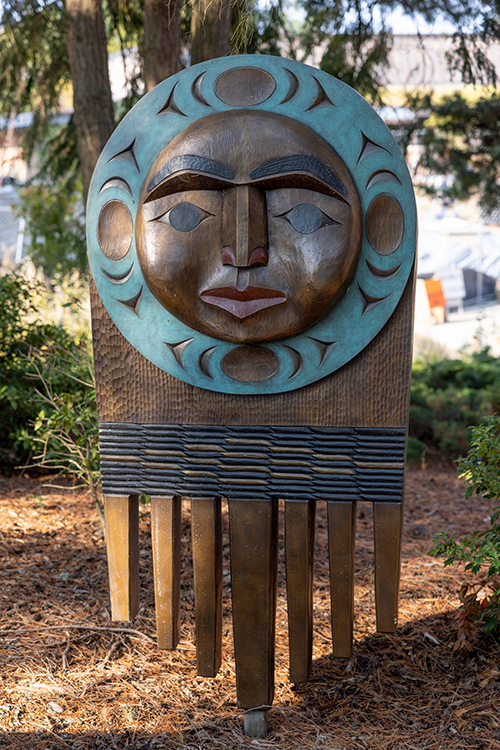Land Education
Importance of a Land Acknowledgement:
Click here for the complete version of our Land Acknowledgement
Incorporating a Land Acknowledgement into our institutional practices is part of a broader effort to disrupt colonial frameworks and promote awareness, accountability, and action. It invites us to learn, listen, and engage in ways that support Indigenous sovereignty and justice. It also serves as a reminder that the land we occupy is not neutral—it carries histories, cultures, and truths that must be recognized.

While land acknowledgements can be a powerful tool for honoring Indigenous Nations and raising awareness, it’s important to recognize that not all Indigenous communities support them. Some view land acknowledgements as having become performative.
As we reexamine traditional practices and strive for more equitable and respectful engagement, we must also consider alternative or complementary actions. True decolonization requires more than words—it calls for reflection, accountability, and sustained effort toward justice.
Land Acknowledgement:
Below is our Land Acknowledgement. This abbreviated version is intended for use during public events, meetings, and similar gatherings.
Shoreline College acknowledges that we occupy the ancestral lands of the Coast Salish Peoples. We recognize The Coast Salish people as the caretakers of this land since time immemorial and as a community, we strive towards building authentic relationships with the sovereign nations of this region. In addition, Shoreline College is committed to truth and reconciliation, and the fostering of an inclusive and supportive environment for all Indigenous communities.
Land Acknowledgement Usage Guide:
Purpose: Land Acknowledgements recognize the Indigenous peoples who have stewarded the land we reside on. They are a step toward honoring Indigenous sovereignty and promoting awareness of colonial histories and ongoing impacts.
Abbreviated Version:
Use for: Meetings, introductions, or smaller gatherings, graduations, groundbreaking ceremonies, or general educational settings.
Goal: Acknowledge presence and history in a concise and respectful manner.
Complete Version:
Use for: Educational settings to provide deeper context, trainings, or workshops for purposes like decolonizing the workspace.
Authentic Representation:
Never require or expect Native employees to read a Land Acknowledgement. If a Native individual volunteers, they may choose to share their own version or statement. It does not have to be a formal Land Acknowledgement, it can reflect story, reflection or anything that feels authentic to them. The goal is not to check a box but to create a space for Indigenous voices and perspectives, in a meaningful way.
Land Education in Action:
Alternatives:
If you meet regularly with the same group, consider alternatives to repeating the same Land Acknowledgement. Share a quote or reading from an Indigenous author or an Elder. Prioritize authenticity and reflection, while avoiding redundancy. Remember that Land Acknowledgements are not necessary in every interaction, particularly in ongoing collaborations with Tribal Nations, as repetition can dilute their significance.
- Continuation of Lushootseed Wayfinding 01/2025
- Embracing Hope so That We May Thrive 2/24/25
- BOT Aloha Training with Dr. Gerry Ebalaroza-Tunnell 2/26/25
- Rising from Within: Nurturing Holistic Wellness for Faulty & Staff 2/28/2025 Attendance
- DEIA Community Check-in with Olmeca 3/5/25
- Reclaiming Power Through Collective Movement: A Creative Journey with Michelle Beardsley 3/6/25
- Olmeca Presents: "Music is My Medicine" 3/6/25
- Olmeca Keynote: Radical Love 3/6/25
- Keynote: Dr. Gerry Ebalaroza-Tunnell presents “Gracious Anger” 5/2/25
- Workshop with Dr. Gerry Ebalaroza-Tunnell: Power of Hā: 5/2/25
- Meeting with the Central Council of the Tlingit and Haida Indian Tribes of Alaska 05/2025
- Participation in the Government to Government Summitt (G2G) 06/2/2025
- Not about You; Not About Me: Towards A Paradigm Shift of Mission Servingness: Michael Beneitz 6/5/2025
- Navigating the Current Moment: Understanding the Shifts in Culture, Education, and Society for College Campuses: Michael Beneitz 6/5/25
- Muckleshoot Effective Teaching Institute June24-26, 2025
- Membership in 5 Star Consortium 07/2025
- Membership in Warrior Affinity Group (statewide affinity group)
- Division name change: Office of yəhaw̓
- Meeting with Squamish Tribe 08/2025
- Native Employee Affinity Group created 09/2025
- Fishing Wars Film Showing with panel 11/14/2025
- Raising of the Muckleshoot Tribe Flag TBD
- Hosted the Government to Government (G2G) Summit 02/16/2023
- Lushootseed Wave finding 01/2024
- Andrea Wilbur Sigo art installation 04/29/2024
- Muckleshoot Effective Teaching Institute June 25-27,2024
- Tribal Liaison Brandon Fryman worked on supporting and building relationships with local Tribes 07/2024
- Membership in 5 Star Consortium 07/2024
- Membership in Warrior Affinity Group (statewide affinity group)
- Aloha Workshop with Dr. Gerry Ebalaroza-Tunnell 7/31/2024
- Meetings with the Muckleshoot Tribal College
- Mazaska Talks: Indigenous Community workshop with Matt Remle 11/4/2024
- Storytime w/Pamela Seamonster 11/14/25
- Our Grandmother the Inlet Film Showing & Discussion 11/18/25 attendance
- Wayfinding Leadership: Navigating with Purpose in Higher Education with Dr. Gerry Ebalaroza-Tunnell 12/16/25
- Visit with the Snoqualmie Tribe 12/20/2024
For more history, resources, and guidance about writing and using Indigenous land acknowledgements, please visit our Land Acknowledgement Learning Guide.